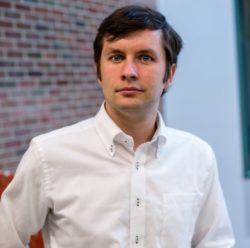
Mr. Philip E. Pare
University of Illinois at Urbana-Champaign
Friday, March 23, 2018
11:00AM – HEC 113
Abstract
The study of epidemic processes has been a topic of interest for many years over a wide range of areas, including computer science, mathematical systems, biology, physics, social sciences, and economics. More recently, there has been a resurgence of interest in the study of epidemic processes focused on the spread of viruses over networks, motivated not only by security threats posed by computer viruses, but also recent devastating outbreaks of infectious diseases and the rapid spread of opinions over social networks. Up to this point these network-dependent spread models have not been validated by real data, and most of the models considered in these recent studies have been focused on network models with static network structures, however almost all systems being considered have inherently dynamic structures.
In this talk, we will discuss the modeling of epidemic processes over topologically varying networks, and present a result for the eradication of viruses. Specifically, we will derive conditions that guarantee convergence to the disease-free equilibrium under varying assumptions on the networks and disease process parameters, and present a convex formulation of a virus eradication control technique. We analyze a mathematical model for network-dependent spread and use that analysis to identify the healing and infection parameters of the model. We apply these ideas, employing John Snow’s seminal work on cholera epidemics in London in the 1850’s, to validate the susceptible-infected-susceptible (SIS) model. The validation results are surprisingly good, capturing the behavior of the cholera epidemic from John Snow’s 1854 dataset quite.
Biography
Philip E. Paré received his B.S. in mathematics with University Honors and his M.S. in Computer Science from Brigham Young University, Provo, UT, in 2012 and 2014, respectively. He is currently an ECE Ph.D. candidate at the University of Illinois at Urbana-Champaign, Urbana, IL completing his research thesis on the analysis of and control design for virus spread over networks. He is a 2017-2018 College of Engineering Mavis Future Faculty Fellow, the winner of the Best Talk Award in the Decision and Control Session of the 13th CSL Student Conference, sponsored and judged by Honeywell, and recently appeared on the University of Illinois List of Teachers Ranked as Excellent by Students, with Outstanding Ratings, for Fall 2017. Philip grew up in Cambridge, MA. His research interests include the modeling and control of dynamic networked systems, model reduction techniques, and time-varying systems.